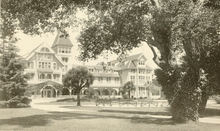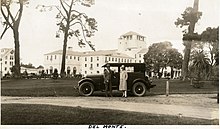| Hotel Del Monte | |
|---|---|
 The former Hotel Del Monte, now known as Herrmann Hall The former Hotel Del Monte, now known as Herrmann Hall | |
| Location | Naval Postgraduate School, Monterey, California |
| Built | 1926–1927 |
| Architects | Lewis P. Hobart and Clarence A. Tantau |
| Owner | Naval Postgraduate School, United States Navy |
The Hotel Del Monte was a large resort hotel in Monterey, California, from its opening in 1880 until 1942. It was one of the finest luxury hotels in North America. During World War II, it closed and the building was leased to the United States Navy. It first was used by the Navy as a school where enlisted men spent the second, third, and fourth months of an 11-month course being trained as electronic technicians. Later the Hotel Del Monte became the Naval Postgraduate School.
History


Charles Crocker, one of California's Big Four railroad barons, established the resort through Southern Pacific Railroad's property division, Pacific Improvement Company (PIC), and opened the first hotel June 3, 1880. The first true resort complex in the United States, it was an immediate success. Nearby, along Monterey Bay, was a railroad depot where the Del Monte (named for the hotel) served patrons arriving by train.
The property extended south and southeast of the hotel and included gardens, parkland, polo grounds, a race track, and a golf course. Originally used for hunting and other outdoor activities, the hotel's property became Pebble Beach, an unincorporated resort community, and the world-famous Pebble Beach Golf Links. The famous 17-Mile Drive was designed as a local excursion for visitors to the Del Monte to take in the historic sights of Monterey and Pacific Grove and the scenery of what would become Pebble Beach. The hotel became popular with the wealthy and influential of the day, and guests included Theodore Roosevelt and Ernest Hemingway as well as many early Hollywood stars.


The hotel's shops included branches of Gump's, I. Magnin and City of Paris.
There have been three buildings on the same site. The first building was designed by architect Arthur Brown Sr., who had been the Southern Pacific Railroad's Superintendent of Bridges and Buildings. It was destroyed by fire on June 1, 1887 and was replaced. Two guests were killed and the hotel damaged in the 1906 San Francisco earthquake. Humorist Josh Billings died at the hotel in 1885.
The Del Monte Golf Course opened in 1897 as a public club. The Del Monte Cup championships were played at the Del Monte Golf Course beginning in 1898, and was open for men and women. It is one the oldest continuously operating golf course in the United States. The first Pacific Coast Golf Association Women's Championship and the first PCGA Open were held at the Del Monte Golf Course.
In 1907 an art gallery was established at the hotel.

Also on the grounds are nine additional structures including the Roman Plunge Pool Complex, built in 1918 and designed by Hobart and Tantau, later the architects of the third hotel building. The pool itself was designed by Hobart. The Roman Plunge Solarium was restored in 2012 by architect James D. McCord. At that time the main Plunge was reconstructed as a reflecting pool and its original above-ground finishes restored. The Arizona Garden (1882), originally designed by landscape architect Rudolph Ulrich, is also on the grounds.
Del Monte Foods traces its name back to an Oakland, California food distributor who used the brand name "Del Monte" for a premium coffee blend made especially for the hotel.

On September 27, 1924, the second of three hotels, Hotel Del Monte building was destroyed by fire. The property surrounding the hotel became known as Pebble Beach, now a world-renowned resort and golf course.
The current building dates from 1926. It was designed by architects Lewis P. Hobart and Clarence A. Tantau.
The Hotel Del Monte was requisitioned by the Navy at the beginning of World War II and used as a pre-flight training school. In 1947, the U.S. Navy purchased the hotel and its surrounding 627 acres for $2.5 million. In 1951, the United States Naval Academy's postgraduate school moved from Annapolis, Maryland to its new location—the former Hotel del Monte.
See also
References
- ^ "History of NPS and the Infamous Hotel Del Monte". Naval Postgraduate School. Archived from the original on July 1, 2013. Retrieved June 22, 2013.
- ^ "Naval Postgraduate School, Monterey". The California State Military Museum. Retrieved June 22, 2013.
- ^ Hathaway, Pat. "Hotel Del Monte, Monterey". California Views: The Pat Hathaway Photo Collection. Retrieved June 22, 2013.
- The Hotel Del Monte, California's Most Historic Resort Publisher: Naval Postgraduate School
- Historic Hotel Del Monte Herrmann Hall Naval Postgraduate School Dudley Knox Library November, 2014
- Bender, Henry E. Jr. (2013). Southern Pacific Lines Standard-Design Depots. Berkeley: Signature Press. p. 43. ISBN 9781930013339.
- "El Carmelo, Pacific Grove Hotel" (PDF). The Board and Batten. Pacific Grove, California. 2002. Archived from the original (PDF) on May 3, 2022. Retrieved March 22, 2022.
- Neal Hotelling (February 17, 2023). "West Coast women's golf starts off just a little in the rough" (PDF). Carmel Pine Cone. Carmel-by-the-Sea, California. p. 21. Retrieved February 21, 2023.
- Edwards, Robert W. (2012). Jennie V. Cannon: The Untold History of the Carmel and Berkeley Art Colonies, Vol. 1. Oakland, Calif.: East Bay Heritage Project. pp. 45–47, 200. ISBN 9781467545679.
- ^ "NAVAL SUPPORT ACTIVITY MONTEREY" (PDF). Archived from the original (PDF) on March 15, 2014. Retrieved June 22, 2013.
- California Preservation Foundation award 2012
- "Pacific Horticulture Society - Rudolph Ulrich's Arizona Gardens". Pacifichorticulture.org. Retrieved November 7, 2017.
- "Our History". Del Monte Foods. Archived from the original on April 13, 2013. Retrieved June 22, 2013.
External links
- Naval Postgraduate School
- Historic photographs from the Naval Postgraduate School, many include the Hotel Del Monte
- Navy Gateway Inns and Suites, Monterey Archived July 14, 2021, at the Wayback Machine
- “On the Monterey Peninsula” (Hotel Del Monte), Shapes of Clay, Gladding, McBean & Co. & Los Angeles Pressed Brick Co., Vol. 2, No. 7, August 1926, pp. 2-11.
36°35′52″N 121°52′24″W / 36.597889°N 121.873312°W / 36.597889; -121.873312
Categories: